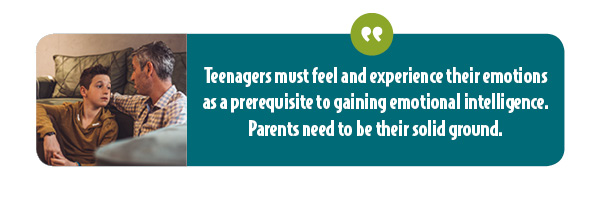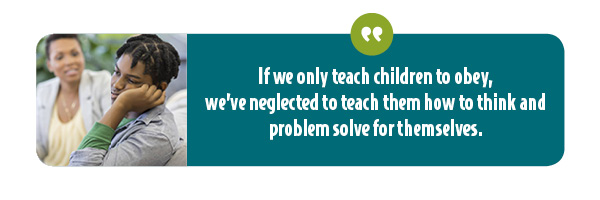One of the most challenging times in parenting is when your child hits the teenage years. Parenting teens is as much a rite of passage for you as it is for your teen. When things get tense, science shows that calmness is key to your teen's brain.
Learn about teenage brain development and parenting tips to keep you sane and the parent-child connection strong!
Estimated reading time: 10 minutes

CONTENTS:
Teenage Brain Development
How Parents Can Inadvertently Keep Rebellion Going
Change Your Perspective to Understand Teen Rebellion
Teenage Rebellion: a Testing Ground for Connection
Is a Rebellious Teenager Stuck in Dependency?
Quote by Dr. Shefali Tsabary
Actions Parents Can Take to Tame Rebellion
How Does a Parent Help Regulate a Teen's Emotions?
Parenting Tips for Open Dialogue
What Can Parents Do to Support Their Young Adults During the Trial Independence Stage?
Concluding Thoughts
Understanding Your Teenager and Staying Encouraged
I’ll never forget my own experience as a first-time parent of a teenager.
During one incredibly difficult time, my 14-year-old son and I had just had an argument, and he stormed off abruptly. My daughter, who was five years younger, had witnessed the whole blow-up.
As she saw the tears welling in my eyes, she looked up at me and said, “He’s still the sweet son you’ve always known; it’s just covered over right now, mom.”
My daughter was right.
Now, years later, my children are grown, and as a parenting coach, I give the same parenting advice to parents struggling with their teen’s attitudes and mouthy reactions.
The sweet and cooperative child is still there.
One of the fears that I hear most from parents echoes the one I felt so many years ago: We are concerned about losing our relationship with our child.
We feel a stark separation as our teens pull away. Even though it's developmentally appropriate, it still hurts and can feel like you're losing them.
Adding to the usual parental wear-and-tear are the razor-sharp barbs we feel from all the glares and verbal jabs (which are sometimes unnervingly accurate). If we allow ourselves to get hooked by these barbs, we might start to buy into the lies that they no longer want us in their life.
Not true.
Even if teens know precisely where to land a punch, we must look beyond their behavior to their growing maturity and incredible humans they are!
Related reading: “Visionary Parenting Is the Key to Capable and Happy Children.”
Teenage Brain Development
There’s no denying that the teenage years can be challenging. Your teen’s brain goes through significant changes, and hormones heighten their emotions. Peers attract their attention like a giant magnet while their desire for exploration is at an all-time high.
Keep in mind that what I’m about to tell you is not an excuse for misbehavior, but a legitimate reason why your teen’s actions seem unpredictable. Their developing brain is quite literally making it difficult for them to control themselves because the amygdala (the alert tower) is hijacking the logical part of their brain.
A Psychology Today article titled, Why Teens Are So Emotional explains this chemical and neural interaction:
“During teen years, the limbic system grows extra ears to listen to gossip and builds more buckets for the hypothalamus to pour in sex hormones such as testosterone (found in all teens, but much more in boys). So, a teen might end up misperceiving a benign ‘hello’ as ‘I am watching you’ or ‘I noticed that pimple.’”
But hang in there!
Your parenting is the life raft your teen needs to get across the stormy waters of the teenage years to the shores of adulthood. And the older they get, the more their logical brain oversees the operations.
Psychology Today goes on to explain how this happens:
“As teens get older (like in their early 20s), the limbic system listens to the more rational parts of the brain like the prefrontal cortex (PFC), and less to the amygdala gossip.
More importantly, the PFC eventually develops and extends fast communication lines to the limbic system, and functions as the ‘brakes’ or inhibitor of excessive gossip. Parenting, education, and opportunities can guide and strengthen the connections between the limbic system and the PFC.”
 How Parents' Responses Affect Teen Behavior
How Parents' Responses Affect Teen Behavior
As parents, when we yell at our teens, poke fun at them, get sarcastic, judge, react, punish, or criticize their friends, our messages can be easily misinterpreted, even if unintentional.
Instead of laughing it off, the teenage brain is likely to reach different conclusions, such as:
- “I need to act a certain way to receive your love.”
- “You don’t like who I am because you’re always trying to change me.”
- “I have to be the person you want me to be, or you’ll withhold your love and support.”
- “You’re not interested in what I think, feel, believe, and experience. You only want me to behave in a certain way to make your life easier.”
- “You expect me to act respectfully when you don’t; who’s the adult here?”
It's easy to think your teen is impervious to your comments when they're testing you, but they are not. They care what you think and need reassurance even when they may scoff at your sincere encouragement.
As their brain undergoes significant changes, your role as a stable figure becomes even crucial in helping them process their experiences, manage their emotions, and develop a sense of security.
By understanding how your child’s brain develops throughout their teenage years, you can better appreciate just how vital it is to be a sounding board and a stable figure in your teen’s life.
By being there for them, you not only strengthen your bond but also contribute to their overall well-being and growth into confident, self-assured individuals.
Related reading: “The Best Way to Deal with Teenage Rebellion.”
How Parents Can Inadvertently Keep Rebellion Going
A parent’s love is stronger than teenage rebellion. You’re determined to keep your teen safe even if they give you attitude. You show your love and desire to protect them by enforcing curfews, correcting behaviors, and handing out consequences.
However, your teen may often view these sincere intentions as an attempt to violate their privacy and control them.
Their job is to build autonomy and individuality, so this rebellious reaction is a natural response.
Unfortunately, teenage rebellion can also make you feel rejected and powerless, so you may react with frustration or by overexerting your authority. “Don’t you dare talk to me that way—you’re grounded!”
Sound familiar?
When you try to overpower teenage rebellion, it confirms for your teen that their parent desires to control them, thus compounding the tension. Skewed perceptions of both parties create a gulf of misunderstanding that strains your parent-teen relationship. This dynamic often results in unnecessary conflicts, disagreements, and fights.
Why?
Because once parents and teens feel estranged from one another, they begin to see each other through clouded lenses. This disconnect increases miscommunication, which, in turn, increases the disconnect, and round and round you go!
So, how do we get off this merry-go-round of angst and disconnection? Try looking at behavior and challenges from a new perspective.

Change Your Perspective to Understand Teen Rebellion
Playing on the famous Verizon ad, “Can you hear me now?” imagine for a moment, your teenager is simply saying,
- “Can you hear me now?”
- “Do you feel my feelings now?”
- “Do you love me now?”
What if your teen is testing the strength of your connection?
What if the way you handle their behavior can fortify your relationship health and the durability of your love?
Parents and Teens Are Longing for Connection with One Another
Often when I work with teens, they tell me that their parents don’t care about them (which is ridiculous, right!?). When we explore this sentiment further, a common scenario usually appears. The teen feels unheard or unloved so they hide out in their bedroom for hours or days on end to avoid the tension.
One couple I counseled had their teen locked in their bedroom for over a year! He wasn't going to school; he wouldn't join them for meals; and severely picked on his young sibling. They all were miserable!
When a teenager isolates in these situations, it can feel like a relief for parents, a solace of sorts. And usually, the parent feels guilt for feeling that way. Meanwhile, the teen brain is misinterpreting this lack of interaction as, “If my parents cared, they wouldn’t allow me to spend so much time alone in my room.”
I coached one 16-year-old teen and her mother recently. The teen was telling me that her parents didn't WANT to spend time with her, just her younger sibling. She even went so far as to say they "don't like me." The mom was distraught that her daughter was spending inordinate time holed up in her bedroom. She felt like her daughter didn't want anything to do with them!
See a disconnect anywhere?
What parents often don’t realize is just how much they miss their teen—or how much their teen misses the closeness they once felt with their parents. When I mention to teens that their parent misses them, they refuse to believe it until they hear it directly from their parents. Once they do hear it, they often cry.
So, the next time your teen talks back or shuts down, take a moment to check in with your own thoughts. If you catch yourself thinking, “They’re just trying to make me mad!” recall how the teenage brain works. Remind yourself that your teen isn’t out to get you, but rather, they’ve probably misinterpreted something you said and need reassurance that you love them.
Teen Rebellion: A Testing Ground for Connection
If we move the dial of our perception slightly, rebellion is a testing ground for parents, so a teen feels safe. There are different ways your teen may seek reassurance and test your parent-child connection while building autonomy. Let’s look at a few:
1) Authenticity
Do your words and actions match? If not, can I believe you?
2) Hypocrisy
Are you living the values you’ve always preached? If not, why should I?
3) Safety and Preparedness
I need to find reasons to leave home.
The safety of your love is too comforting, and I know the world can be unkind. The security makes it harder for me to separate (and I’m already scared of the vast responsibility of being on my own.)
4) Limits and Boundaries
Do you love me enough to be incredibly discomforted by enforcing healthy boundaries when I push back?
As difficult as it can be to set healthy boundaries, your teen needs them to feel safe.
5) Accountability and Acceptance
Are you strong enough to hold me accountable at my worst? If you are not, how will the world accept me when I leave home?

Is a Rebellious Teenager Stuck in Dependency?
According to Psychologist Carl E. Pickhardt, rebellion is dependency, not autonomy. To carve their own individuality, they need an accurate mirror and solid ground created by their parents.
“Although the young person thinks rebellion is an act of independence, it actually never is. It is really an act of dependency. Rebellion causes the young person to depend their self-definition and personal conduct on doing the opposite of what other people want.
This act of doing the opposite can often be mistaken for carving out a unique identity. However, it's a reactive process, meaning their choices are still tethered to the expectations they are trying to oppose. True independence, therefore, isn't about opposing others; it's about self-directed growth.
That's why the antidote for rebellion is the true independence offered by creating and accepting a challenge — the young person deciding to do something hard with themselves for themselves in order to grow themselves. The teenager who finds a lot of challenges to engage with, and who has parents that support those challenges, doesn't need a lot of rebellion to transform or redefine him or herself in adolescence.”
If you overreact or react negatively, then your teen is more likely to engage and move to defend their self-respect and autonomy. In heated exchanges, they will fail to see themselves accurately, and they will not accept the need to change their behavior.
However, when teenagers take ownership of their actions and decisions, genuine autonomy can be achieved. Parents who are responsive and curious versus reactive and judgmental minimize the child's need for rebellion as a means to define their identity.
Only when your teen has a safe and accurate mirror can they learn to self-correct and process their emotions efficiently. You’ll need to tolerate your own discomfort to be able to be effective and fully present for your children.
“The point about feelings is that they don’t have to make sense, don’t need to be justified, and don’t require our approval. Because we are so oriented to intellectualizing, we want to explain feelings away instead of allowing our children to simply experience them. The issue is our own discomfort, which we need to learn to tolerate.”
~Dr. Shefali Tsabary
Make the health of your relationship with your teen a top priority.
Staying connected in loving ways is a crucial ingredient for developing your teen’s ability to regulate their emotions.
Their brain architecture, specifically the frontal cortex, will successfully complete its development as you show them unconditional acceptance.

Key Actions Parents Can Take to Tame Rebellion
When it comes to a teen’s testing ground, there is one powerful thing that you can do as a parent to curb rebellion and misbehavior: MODEL the behavior, values, and respect that you want to see from them.
When you don’t behave the way you expect them to behave, they’ll bluntly point it out. You’ll also discover there are contradictions between your words and actions by how much your teen acts out.
Does this mean that your teen gets to act any way they please?
Does it mean that you should let disrespect or dishonesty slide?
Oh no!
However, when you do hold your teen accountable to be their best, you need to do it with love and respect that’s backed by a sincere desire to understand their point of view.
Teenagers need you to catch them in the safety net of your love and accept them unconditionally.
Model Calmness and Self-Regulation
So, what exactly do you need to model?
The teen brain needs a parent’s stability and calmness to modulate their emotions as their brains complete their wiring.
Brain development requires extensive life experiences. The lack of maturation of your teen’s brain is why they can be quick-witted and highly intelligent at calm times but unable to respond respectfully at stressful times. Therefore, your responses and communication with your teen directly influence their developing brain.
How Does a Parent Create Calmness and Help Regulate Their Teen’s Emotions?
|
Related reading: “Teenage Rebellion and the Teen Parent Connection.”
I get it. Staying calm during intense confrontations isn’t easy. We’ll all reach our limit, so when you’re about to blow a gasket, say, “If I respond right now, I’m going to regret what I say. I need to self-calm, then let’s talk.” This models self-restraint and self-calming. Then get in touch with your love for your teen and circle back to discuss what happened and resolve it.
Now, you may be skeptical that this tactic will work, or think that your teen would interpret this as accepting misbehavior.
When teaching my Hacking the Teen Brain parenting class, parents often have difficulty when I recommend responding to teens with empathy and calmness. They think that treating teens with love and respect when they are being disrespected is akin to rewarding negative behavior.
One dad in a class told me that his 16-year-old daughter was going to obey and respect him no matter what. Find out what happened.
 I asked this father a couple of questions:
I asked this father a couple of questions:
- “What are you modeling when you yell and overpower your daughter?”
- “Fast forward six years: Do you want your daughter to be submissive to a husband who disrespects her and for her to tolerate possible abuse?”
He had no response—only dead silence.
He got it!
And then, he immediately volunteered to practice the skill of setting firm boundaries with empathy.
Our teens need to practice emotional modulation and self-control in a safe environment before they can apply this behavior when the risks are higher.
There’s nothing more reliable than our love.
What we forget in the heat of the moment is our long-term goals for our teens; we drop our primary responsibility: to model. When we get angry and yell, we teach them to react the same way; when we overpower them, we teach them to either dominate others or to be submissive to those stronger than themselves.

To be a self-reliant, respectful, interdependent adult requires maturity and skill. One of the reasons effective modeling is so powerful is that we are showing teens how to navigate relationships successfully, even when it is difficult.
Model Open-Mindedness to Create Opportunities for Open Dialogue
You’re bound to have different opinions than your teen. They are learning and growing. They’re deciding who they are and what they believe as they individuate. Support them in this personal growth and identity development. Listen and create a space for them to be themselves without censure, judgment, or commentary. Wait for them to ask your opinion; then be engaged, but lovingly detached when they disagree.
Your teenager needs to know that you’re interested in who they are becoming. Get curious when they challenge your beliefs. Create opportunities to listen. Seek to understand. You imparted your values when they were younger. Now let them decide what is right for them and what they will value as they become young adults.
Welcome friendly arguments.
Although intense, this form of communication is rich for understanding your teenager far better. Use heated discussions as a springboard to discover how your teen thinks. When you allow this type of banter, you learn what concepts they are exploring, possible moral dilemmas they are struggling with, or relationship challenges they are grappling with.
Now, you have an opportunity to impact your teen and provide critical input that their peers most likely won’t have.
Be solid. Stay steady. Be a foundation of stability for your teens, where they can always come to find their ground and rediscover themselves and their truth.
Parenting Tips to Create Open Dialogue with Your Teen:
|
Model Humility
It takes practice for anyone to be comfortable admitting when they’re wrong. As parents, we don’t have all the answers, and we’re going to make mistakes. Sorry to break it to you: There are no perfect parents. Don’t pretend to have all the answers, but be willing to discuss and arrive at win-win solutions.
Admit when you made a mistake and apologize when you assumed something and reacted unfairly.
Many parents have told me that they were never allowed to have opinions growing up; they weren’t allowed to question their parents; they weren’t allowed to object. “Do as you’re told” was their parents’ response to every situation.
This reaction stifled their abilities to trust themselves, voice opinions, and share what they were thinking. And this stranglehold robbed them of a rich inner world and intimacy with their friends and spouses.
Obedience is overrated. Why?
Children and teens need to practice resolving conflict while respecting the rights of others. If we only expect and enforce obedience, they miss out on crucial opportunities to flex these muscles.
Critical thinking is valuable, especially with all that teens are up against today. When children only obey without asserting their desires, they practice submission and compliance (or rebellion). They need to first be themselves and experiment with voicing their truth in the safety net of loving parents. These parent-child interactions are how they learn to be respectful when communicating.
And parents don't have all the answers; you'll be pleasantly surprised how incredible the interior life of a teen is and how much they want to share themselves with you.
And don’t be afraid to be human.
Model humility. One of the greatest gifts you can give your children and teens is the knowledge of human vulnerability while also setting healthy boundaries to care for ourselves.
If you can incorporate modeling and the actions mentioned earlier into your parenting, you will build a more resilient relationship with your teen, and you will assist in your teen’s healthy brain development. Plus, your family will be closer, too. It’s worth the effort!
Related reading: "Parenting Tips to Encourage Self-Reliance and Decrease People Pleasing in Children."
What Can Parents Do to Support Their Young Adults
During the Trial Independence Stage?
Navigating the independence stage can be challenging for both parents and young adults.
This period in the teen's development and the parent-child relationship is marked by the teenager's exploration of their identity. Your teenager's increasing independence often comes with resistance.
However, there are practical steps parents can take to support their young adults during this critical phase:
Allow Natural Consequences
One key approach is to allow young adults to experience the natural consequences of their decisions.
Instead of stepping in to shield them from every potential failure or discomfort, parents need to let mistakes become valuable learning opportunities.
These natural consequences that life will give them promote resilience and responsibility, equipping them with critical life skills. Of course, it can be scary for parents to allow these consequences because the increased risks in a teenager's life are often life-threatening.
Therefore, choose those situations that will be safe, such as, not reminding them to do their homework, letting them get a rebuke from their soccer or basketball coach for being late for practice, or delaying college applications due to procrastination of essays.
Life lessons take you out of being the "bad guy" and can be even very influential.
Provide Guidance Without Overpowering
While it's essential to offer advice, it's equally important to recognize their need for autonomy.
Encourage open dialogue and be there to guide without imposing your opinions or authority. Seek to understand how they think and what they value. Validate them for the ways they live those values.
This openness helps them feel supported yet independent in their decision-making process.
Foster a Safe Environment for Discussion
It can't be overemphasized how vital it is to create an open and nonjudgmental space where your teen feels comfortable discussing their thoughts and feelings.
Accomplishing this safe space may require you to bite your tongue; it should be a criticism-free zone.
Encourage them to share and provide opportunities when there is time available for meaningful conversations.
Also, regular check-ins can help parents stay connected with their young adults’ experiences and struggles, strengthening the parent-child bond.
Encourage Self-Reflection
Help your teenager understand the impact of their choices by encouraging self-reflection. By asking questions that lead them to valuable conclusions, they'll be better equipped to connect the dots between their behaviors and the outcomes.
This back-and-forth dialogue can involve discussing potential results of various directions and decisions or helping them align their actions with their long-term goals. Ask if their short-term decision supports more important values and goals.
This practice aids in developing a greater sense of self-awareness and accountability for their choices.
Set Reasonable Boundaries
Maintaining healthy boundaries is crucial and can be much more challenging during the teenage years.
Clearly communicate the expectations in aspects like safety and respect. This loving limit ensures a structured environment where your young adult can explore with a safety net, knowing there are clear parameters within which they can interact with life and their peers.
By adopting these strategies, parents can effectively support their young adults as they transition to adulthood, developing a healthy sense of independence and maturity.

Thoughts to Conclude
Keep in mind what my daughter so aptly reminded me of years ago, the sweetness of your teen is only covered up for now. It will return, and you have the power to expedite its return. You hold the keys. It’s up to you whether your teen opens the door to their inner self. Remember to view your teen’s behavior as a cry for connection and love!
They want to know, “Can you hear me now?” “Do you feel my feelings now?” “Do you love me now?”
Your love is greater than teenage rebellion.
Stay encouraged!
Frequently Asked Questions
How do adolescence express rebellion toward authority during trial independence stage?
Adolescents often begin this developmental stage of independence by challenging parental authority with a firm "You can’t make me!" As they advance into the trial independence stage, a shift occurs: they start resisting their own authority with the phrase "I can’t make me!"
Having replaced their parents' guidance with their own decision-making power, they often find themselves in conflict with their internal expectations.
This phase of self-rebellion is characterized by a belief: “I don't want to be controlled, not even by myself!”
Examples of Self-Rebellion
-
Punctuality at Work: A young person may recognize the necessity of arriving on time to a job. Yet, despite this understanding, they struggle to wake up early enough to meet this responsibility.
-
Academic Responsibilities: Students might intellectually grasp the importance of attending classes and completing assignments. However, motivation wanes, and they find it difficult to adhere to these commitments.
-
Social Situations: While aware of the negative consequences of excessive drinking at social gatherings, adolescents often find it hard to control their behavior amidst peer pressure.
In these times of "rebellion" against their self-interest, parents are encouraged to let natural consequences unfold as mentioned earlier.
By stepping back and allowing adolescents to experience the outcomes of their choices, they provide a crucial learning opportunity. This process is essential for adolescents to overcome this self-rebellion and embrace the self-governance needed for adulthood.
Related reading: “Keys to Turn Defiance into Healthy Self-Esteem.”
For personalized parenting coaching, email us at support@heartmanity.com and check out our many parenting resources and parenting classes.









